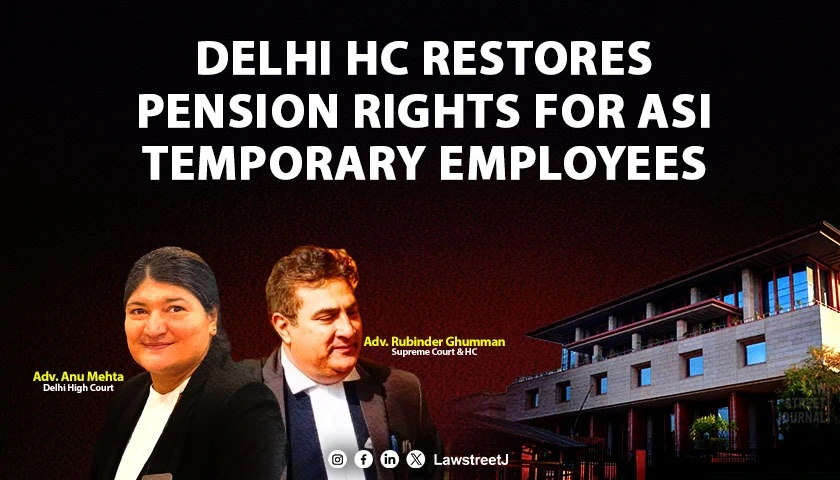New Delhi: In a significant judgment, the Delhi High Court has upheld the pension rights of five former employees of the Archaeological Survey of India (ASI), ruling that their decades of service under temporary status could not be used as a justification to deny them pensionary benefits. The court denounced the long-standing practice of keeping employees in a perpetual state of temporary employment, calling it a violation of international labor standards and an attempt to evade long-term obligations towards workers.
Delhi High Court Rules in Favor of ASI Employees: Pension Rights Restored After Decades of Service
A division bench of Justice C. Hari Shankar and Justice Ajay Digpaul quashed an order that had denied pension to the petitioners, all of whom had served for over two decades before retiring between 2010 and 2014. The court held that they were entitled to pensionary benefits on par with regular employees, directing the authorities to release their dues within eight weeks. In the event of any delay, the court imposed an interest penalty of 12% per annum from the date of their superannuation until the payments were made.
Government Temporary Workers Exploited? Court Condemns Misuse of Contractual Employment
While delivering the judgment, the court strongly criticized the institutionalized exploitation of temporary workers in government bodies, emphasizing that while temporary contracts were originally intended for short-term or seasonal needs, they have now been misused to deprive employees of their rightful benefits. It pointed out that many workers who perform essential and recurring tasks continue to be labeled as temporary or contractual, even though their roles are identical to those of regular employees. The court observed that such a misclassification not only strips workers of job security but also denies them financial and social benefits that are crucial for their sustenance.
The judgment also highlighted the arbitrary nature of employment termination faced by temporary workers, stating that they are frequently dismissed without cause or notice, leaving them in a constant state of uncertainty despite years of dedicated service. Additionally, it noted that temporary employees are routinely excluded from career advancement opportunities, denied promotions, and barred from pay raises, effectively creating a system where their contributions remain undervalued. The court expressed concern over the increasing reliance on outsourcing to replace temporary employees, describing it as a deliberate attempt to bypass the obligation to provide stable employment.
One of the most pressing concerns raised in the judgment was the systematic denial of basic rights and benefits to temporary employees, including pensions, provident funds, health insurance, and paid leave. The court stressed that even employees who have served for decades are often denied social security, subjecting them and their families to undue financial distress, particularly in cases of retirement, illness, or unforeseen circumstances.
The High Court strongly condemned the misinterpretation of the Supreme Court’s ruling in Secretary, State of Karnataka v. Uma Devi (2006), stating that government institutions have been misusing the judgment to reject legitimate claims of long-serving temporary employees. It clarified that Uma Devi distinguished between “illegal” and “irregular” appointments and explicitly recognized that employees engaged in duly sanctioned posts for over ten years should be considered for regularization. However, the court observed that many institutions selectively apply this judgment to deny workers their due benefits, thereby distorting its original intent.
Referring to the Supreme Court’s ruling in Jaggo v. Union of India (2024), the High Court reiterated that keeping employees on a temporary basis for extended periods contravenes international labor standards and exposes institutions to legal challenges. It emphasized that government departments, as model employers, must lead by example in ensuring fair and stable employment practices. By continuing to engage workers on a temporary basis for years without regularization, the court warned, institutions not only violate fundamental labor rights but also undermine employee morale and create an unstable workforce.
In light of these findings, the Delhi High Court ruled in favor of the petitioners (represented by Advocates Anu Mehta and Rubinder Ghumman), directing ASI to compute and release their pensionary benefits within eight weeks. The court made it clear that failure to comply with this directive would result in an interest penalty of 12% per annum, reinforcing the principle that prolonged exploitation of temporary employees will not be tolerated under the law.
The petitioners were represented by Advocates Rubinder Ghumman and Anu Mehta.
Case Title: Birma Devi & Ors. v. UOI & Anr.







![Delhi High Court Sets Aside Arbitral Tribunal's Award Against NHAI in Highway Project Delay Case [Read Judgment]](/secure/uploads/2023/07/lj_9605_23374c2e-392c-4491-a2fe-f2f12fc5272f.jpg)
![Delhi Court Rejects Stay Request in Defamation Case Against Rajasthan CM Ashok Gehlot [Read Order]](/secure/uploads/2023/08/lj_5208_80de1ddc-d76a-4f7f-b180-408e3ae14fb4.jpg)





